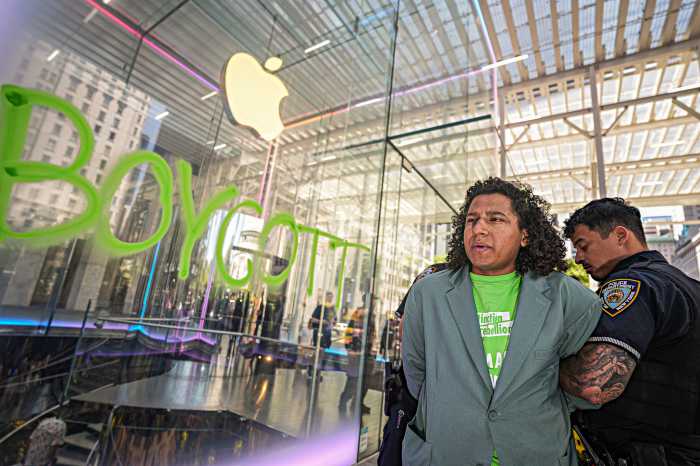By Charles Hack
Newly-minted Russian-speaking citizens, eager to enjoy democracy for the first time, are being denied their voting rights for lack of translation services, says a prominent voting rights advocacy group.Polling stations lack translators, observers, and poll attendants in areas with high concentrations of Russian-speaking immigrants, according to the Civic and Voter Education Initiative (CVEI) and the Local Russian Emigre Organizations (LOREO).“In too many areas, where representation of Russian speakers is significant, we don’t have translators,” said Gene Borsh, director of LOREO, which is based at 333 Seventh Avenue. “There are so many places where we have very substantial Russian populations who would like to vote and participate. It would be the goodwill for Board of Elections to provide information in that language.”Russians and other locals in Brighton Beach have been unable to vote at a polling station at their local library since the Board of Elections stopped using it in 2001.The CVEI’s campaign to improve translation services sprang from feedback they got from poll workers and activists after holding seven forums around New York City — with three in Brooklyn.“The majority of people expressed certain concerns,” Borsh said.Having no translation services means that some voters may have been too confused to vote, Borsh says.Translators are the only poll workers that can help non-English speakers understand the voting process at voting stations.Borsh said he was also concerned about the legality of not providing translation services where non-English speakers are highly represented.The Board of Elections is obliged to provide translation services in English, Spanish, Chinese and Korean. But they should also provide translations to clusters of foreign language speakers.Mayor Michael Bloomberg had indicated that the polling station at the Brooklyn Public Library on 16 Brighton First Street might open for the fall elections. But as yet nothing has happened.“There is a huge Russian population close to the public library,” said Marina Belotserkovski, director of Russian outreach with CVEI. “The community complained when it was closed because it was very convenient for the elderly population to walk in there.”Ruth A. Wagner, spokesperson for the Brooklyn Public Library, says that the labor contract requires Brooklyn Bridge Library to provide library services on election day.She says that it is impractical to have a library and polling station open at the same time.But Brooklyn Bridge Library is working to resolve the problem, she says.“We aren’t opposed to using it as a polling site,” said Wagner. “We are working with the Board of Elections to open this library as a polling site, but we can’t promise anything on our end.”“We would never say ‘no’ because we are in the business of providing services to the community,” she added.Belotserkovski welcomed the cooperative spirit.“I think this can be worked out if politicians are interested in having this very convenient polling site,” she said.But the Board of Elections failed to reply to repeated requests for information regarding their translation and other election polices.Another problem faced by non-English speakers is understanding how to operate new voting machines.While willing to assist getting translated election materials to election sites, and educate voters, the CVEI called on the Board of Elections to change its policies.Belotserkovski says that there are an unusually high number of seniors in the Russian population, many of whom do not speak English and have problems getting to the polling stations.“In communities where there are high concentrations of Russian speaking voters in the community, there are also high numbers of elderly,” said Belotserkovski. “We really need services geared to that population.”Several politicians have backed the campaign by writing letters of support to the Board of Elections. Among the supporters, Borsh counts State Senator Carl Kruger; Assemblymembers Helene Weinstein, William Colton and Steven Cymbrowitz; and Councilmembers Michael Nelson and Domenic Recchia.“We really hope that there will be a positive change,” Belotserkovsk said. “The more people they bring to the voting places, the more the city will gain, and the more the people will gain. It is a win-win situation.”






























